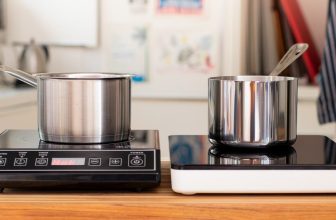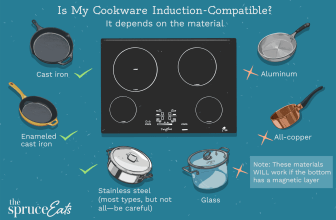As an Amazon Associate I earn from qualifying purchases.
Are Portable Induction Cooktops Any Good?
Are Portable Induction Cooktops Any Good? Picture this: a cooktop that heats your pan faster than a gas stove, yet remains cool to the touch. Portable induction cooktops have revolutionized modern kitchens with their energy efficiency and safety features. Are they truly a game-changer in culinary technology?
Are Portable Induction Cooktops Any Good?
Historically, induction cooking technology dates back to the early 20th century, but its portable versions have only recently gained popularity. According to recent surveys, over 70% of professional chefs have started incorporating portable induction cooktops into their kitchens. Their precise temperature control offers a consistent cooking experience, making them particularly suitable for both amateur cooks and seasoned chefs alike.

Unraveling the Functionality of Portable Induction Cooktops
Portable induction cooktops operate using electromagnetic currents to heat pots and pans. Unlike traditional gas stoves, they do not use an open flame. This makes them a safer option for many kitchens. The cooktop itself stays cool as it only heats the cookware directly. This innovative method provides quick and efficient heating.
One of their main advantages is precision. You can control the temperature accurately, which is ideal for recipes requiring exact heat levels. Temperature changes happen immediately, much faster than other methods. This brings a new level of control to home cooking. Additionally, they are highly energy-efficient.
Traditional cooktops lose much of their heat to the surrounding air. Induction cooktops, however, direct almost all the energy into the cookware. This results in less wasted energy. It’s great for saving on electricity bills and reducing your carbon footprint. It’s an eco-friendly choice.
Portable induction cooktops are also versatile. They are easy to move and set up in different locations. This flexibility makes them perfect for small apartments or outdoor cooking. Just plug in and cook, no need for complex installation. Adaptability is their strong suit.
Comparison with Traditional Gas Stoves and Electric Cooktops
When comparing portable induction cooktops to traditional gas stoves, one of the first differences is efficiency. Induction cooktops transfer heat directly to the pan, wasting less energy. Gas stoves, on the other hand, lose a significant amount of heat to the surrounding air. This makes induction cooking quicker and more energy-efficient. Additionally, induction cooktops avoid the risk of open flames.
In terms of temperature control, induction cooktops provide precise adjustments. They allow users to set exact temperatures, which can be tricky with gas stoves. Gas stoves offer a more visual indication of heat with flames. However, the precision of electric signals in induction cooking is hard to beat. It brings consistency in cooking that many chefs appreciate.
Electric cooktops, compared to induction, also have their own characteristics. Traditional electric cooktops often take longer to heat up and cool down. This slow response can be frustrating for quick-cooking tasks. Induction cooktops heat faster and cool down almost immediately. This makes them more suitable for recipes requiring rapid temperature changes.
While both gas and electric stoves have been kitchen staples for years, many modern kitchens are opting for induction. The safety, efficiency, and control provided by induction cooktops offer compelling advantages. They are also easier to clean, as spills do not burn onto the surface. Overall, they represent a blend of modern technology with practical benefits.
Evaluating the Efficiency of Portable Induction Cooktops
Portable induction cooktops are often praised for their energy efficiency. By using electromagnetic currents, they convert energy directly into heat within the cookware. This method is far less wasteful compared to traditional heating elements that lose heat to the surroundings. Studies show that induction cooktops can be up to 90% efficient. This higher efficiency translates to lower electricity bills.
Another notable aspect is their rapid heating capability. Induction cooktops heat up faster than gas or electric stoves, reducing cooking time. This speed is especially useful for boiling water or searing meats quickly. The immediate heat response saves time and makes meal preparation easier. It’s a time-saver for busy households.
Temperature control on portable induction cooktops is highly precise. Users can adjust heat levels smoothly and accurately. This is crucial for delicate tasks like melting chocolate or making sauces. The cooktop responds almost instantly to adjustments, preventing overcooking or burning. This level of control improves overall cooking quality.
Beyond energy efficiency, induction cooktops are also user-friendly. They usually come with digital controls and preset cooking modes. Some even have timers and safety features like automatic shut-off. These added conveniences make cooking easier and safer. They enhance the overall cooking experience significantly.
Emphasizing the Safety Features Associated with Portable Induction Cooktops
Portable induction cooktops are designed with safety in mind. One of their standout features is the lack of open flames. This significantly reduces the risk of kitchen fires. The cooktop surface itself stays cool, preventing accidental burns. It’s a safer option for homes with children.
Another important safety feature is the automatic shut-off function. If the cooktop detects that no cookware is present, it turns off automatically. This helps to prevent overheating and conserves energy. Many models also include timers that turn off the cooktop when the set time is reached. These features add an extra layer of safety and convenience.
Induction cooktops also have sensor technology to monitor temperature. If a pan overheats, the cooktop can lower the temperature or shut off to avoid burns. This control ensures that food is cooked safely. Sensors can also detect if a pan has boiled dry. These technologies help to prevent kitchen accidents.
Many portable induction cooktops are built with child-lock features. This prevents curious kids from accidentally turning the cooktop on. It’s a simple but effective safety measure. These child-locks are easy for adults to enable and disable. It’s an excellent feature for family kitchens.
In addition to these features, induction cooktops generally have smooth, easy-to-clean surfaces. This minimizes the risk of cross-contamination from spills. A clean kitchen is a safer kitchen. Their design makes maintaining hygienic cooking conditions simpler. This contributes to a healthier cooking environment.
The Flipside: Analyzing the Disadvantages of Portable Induction Cooktops
While portable induction cooktops offer numerous advantages, they do come with some drawbacks. One significant issue is the cookware compatibility. Induction cooktops require magnetic cookware, which can be restrictive. Users might need to purchase new pots and pans if their current ones are incompatible. This adds extra cost and inconvenience.
Another downside is the noise. Portable induction cooktops often produce a hum or buzz during operation. This can be distracting, especially in a quiet kitchen environment. The noise is usually caused by the cooling fans and electromagnetic processes. While it doesn’t affect cooking, it can be an annoyance for some users.
There are also concerns about sensitivity. Induction cooktops are highly responsive, which can be tricky for beginners. Minor adjustments in heat settings can cause significant changes in cooking temperature. This requires a learning curve for new users. It might take some time to get used to the precise controls.
The initial cost of portable induction cooktops is often higher than traditional stoves. Although they save money on energy bills in the long run, the upfront investment can be steep. This might deter some people from making the switch. Budget-conscious buyers might find it a challenge.
Electrical dependency is another factor to consider. Portable induction cooktops rely entirely on electricity to function. In case of power outages, they become unusable. This is not an issue with gas stoves, which can still operate without power. Preparing a backup plan is advisable.
Frequently Asked Questions
Portable induction cooktops are becoming more popular for their speed and efficiency in cooking. Here are some common questions and answers to help you understand them better.
1. What types of cookware are compatible with portable induction cooktops?
To use a portable induction cooktop, you need cookware made of ferrous material, meaning it must contain iron or have a magnetic bottom. Common options include cast iron, stainless steel, and some newer non-stick pans made specifically for induction cooking.
You can check compatibility by seeing if a magnet sticks to the bottom of the pan. If it does, it’s suitable for an induction cooktop. Unfortunately, glass, copper, and aluminum pots won’t work unless they have a magnetic layer on the base.
2. Do portable induction cooktops save energy compared to traditional stoves?
Yes, portable induction cooktops are highly energy-efficient because they transfer heat directly to the cookware with minimal loss to the surrounding air. This direct heating method results in faster cooking times and less wasted energy compared to both gas and electric stoves.
This efficiency not only saves on electricity bills but also makes the kitchen environment cooler since less residual heat is produced. Studies suggest that induction cooking can be up to 90% efficient compared to around 70% for conventional methods.
3. Are there any health concerns associated with using portable induction cooktops?
Some people worry about electromagnetic fields (EMFs) generated by induction cooktops, but extensive studies have shown they are safe for everyday use. The levels of EMFs produced by these devices are within international safety standards and pose no significant health risk.
The primary precaution is to ensure that people with pacemakers consult their doctors before using an induction cooktop as the EMFs might interfere with medical devices if they get too close. For most users, however, these devices represent no danger.
4. How do I clean and maintain a portable induction cooktop?
Caring for your portable induction cooktop is relatively simple due to its smooth surface. After letting it cool down completely, wipe away spills with a damp cloth or sponge using mild detergent if needed.
Avoid abrasive cleaners or scrubbing pads that could damage the surface’s finish. Regular maintenance will keep it looking new and operating efficiently longer-term.
5. Can I use my portable induction cooktop outdoors?
While primarily designed for indoor use, many models can be used outdoors provided there’s access to electrical outlets and protection from extreme weather conditions like rain or excessive wind.
If you’re planning an outdoor activity such as camping or BBQs where quick setup matters most alongside safety measures concerning electrical appliances—ensure proper handling guidelines per manufacturer instructions apply when making those decisions!
Conclusion
Portable induction cooktops offer a blend of efficiency, safety, and speed that makes them an appealing choice for modern kitchens. Their ability to precisely control temperature and reduce energy wastage provides significant advantages over traditional cooking methods. Despite a few drawbacks, the benefits they bring to the cooking experience are substantial.
As technology continues to evolve, portable induction cooktops are likely to become even more advanced and accessible. They represent a smart, future-forward choice for home cooks and professionals alike. Embracing this technology can enhance the cooking experience and offer practical solutions to everyday culinary challenges.

Maksuda Khanam is a passionate home appliance expert and the primary author behind KitchenMarts.com






